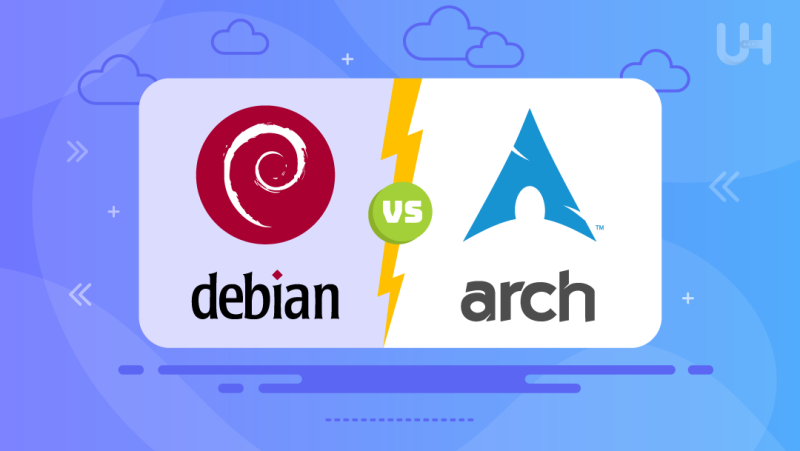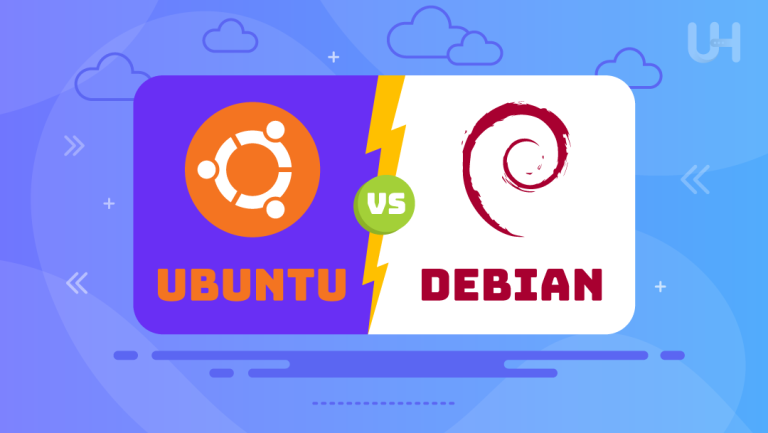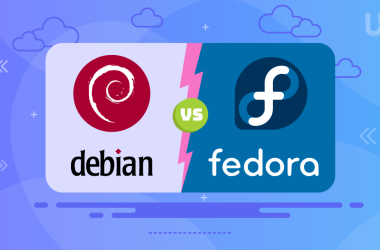To the Linux enthusiast, distribution often differentiates between a great experience and control. Two of the most prominent distributions, Debian vs Arch Linux, represent distinct philosophies and approaches to package management, system stability, and user control. Both are quite popular, each with their specific features and advantages that draw a dedicated following. Whether you are a fresher or an advanced user, the choice between them affects the way you will deal with your system in everyday interaction.
In this article, we will examine the key differences between Debian vs Arch Linux. We will examine what each distro offers, weigh its pros and cons, and provide insight into where each best fits. By the end, you should be better equipped to determine which Linux distribution suits your needs.
What is Debian?
Debian is one of the oldest and most stable Linux distributions. It was born in 1993 and became a powerful and versatile operating system, forming the basis for popular distros such as Ubuntu and Linux Mint. This operating system is renowned for its stability, especially on the “Stable” branch of Debian. It undergoes long testing before any packages can make their way into the repositories. Therefore, it should be ideal for users who want a fiat and headache-free system that will not break every time updates occur.
Debian has three main branches: Stable, Testing, and Unstable. The Stable branch is recommended for production use because it guarantees fewer bugs and the highest level of reliability. Testing and Unstable target users who wish to try out recent software versions, with the trade-off of experiencing occasional system crash events.
Pros and Cons of Debian
When compared to other distributions, Debian’s pros and cons become clear. Debian’s system architecture can handle maximum stability, but this comes with trade-offs in terms of package freshness and flexibility.
| Pros | Cons |
| Highly stable and reliable | Software versions can be outdated |
| Wide community support and documentation | Not ideal for bleeding-edge software |
| Ideal for servers and production systems | Fewer customization options by default |
| Huge repository of precompiled software | Initial setup can be time-consuming |
Whom is Debian Ideal For?
- Users seeking a stable, long-term solution for production environments
- Developers who prioritize reliability over the latest features
- Administrators managing servers, websites, or other critical services
- Users who prefer a well-established, well-supported distribution
What is Arch Linux?
Arch, on the other hand, is a rolling-release distribution for users who want to run the most current software at any one time. Founded in 2002, Arch rests on simplicity, enabling you to install and build your system from scratch with minimal pre-installed software. The leading philosophy that Arch takes is “Keep It Simple, Stupid,” or KISS. Thus, it places the user in full control of customizing everything. You can install only what you need, making it highly efficient.
Unlike the Debian distribution, Arch doesn’t have different stable and unstable branches. Instead, Arch is a bleeding-edge rolling release: users constantly receive updates and always get the latest features and software. The downside is that Arch is less stable than distributions such as Debian, and sometimes, an update can bug or even break something.
Pros and Cons of Arch Linux
Arch’s rolling-release model and customization come with several advantages and disadvantages. While it offers unparalleled control and access to the newest software, it may not be the best choice for those seeking stability or a hands-off experience.
| Pros | Cons |
| Rolling-release provides the latest software | Requires more maintenance |
| High degree of customization | Less stable due to constant updates |
| Lightweight and efficient | Steeper learning curve |
| Access to Arch User Repository (AUR) | No official installer |
Whom is Arch Linux Ideal For?
- Power users who prefer control over every aspect of their system
- Developers who need the latest development tools and software packages
- Linux enthusiasts interested in learning and experimenting with the system
- Users willing to invest time in maintenance and troubleshooting
Elevate Your Linux Experience with VPS Hosting!
Looking for a more powerful and flexible way to run Debian or Arch? UltaHost’s Linux VPS Hosting offers the ideal solution, giving you complete control, high performance, and unmatched stability. Get started today and optimize your Linux setup!
Debian vs Arch Linux: Similarities

Although Debian vs Arch Linux philosophically represents opposite poles regarding Linux distribution philosophies. They share quite a number of similarities, especially regarding the concern of open-source principles and deep-seated Linux-style roots.
Open-Source Nature
Debian and Arch Linux are free-software-friendly, and their source code is freely available for users to look at, modify, and redistribute. Debian is very strict about free software; officially, it contains only open-source software. Arch Linux also shares the same philosophy but is a bit more flexible, packaging proprietary software for its users who may need access to non-free packages in the Arch User Repository.
Based on the Linux Kernel
Debian and Arch Linux are based on the Linux kernel, which is the core component shared by all flavors of Linux. The Linux kernel provides the necessary system functions for the OS to interface with hardware. Debian is more conservative and selects kernel versions that are quite stable. At the same time, Arch allows its users to use the latest kernel versions freely, ensuring their system supports bleeding-edge hardware and new features when they become available.
Strong Communities
Both Debian and Arch Linux have active and committed communities for developing, improving, and supporting these distributions. Debian has one of the oldest and best-organized communities; its vast documentation and troubleshooting forums are second to none. Arch’s community is much smaller but highly energetic and known for the Arch Wiki. It is one of the most comprehensive sources of knowledge on Linux. The community makes this distribution quite accessible and well-supported for users at different levels.
Wide Range of Software Support
Debian and Arch Linux have huge software repositories. Debian provides a repository that holds over 50,000 packages. It is highly stable and tested for issues, making it more viable for production usage. On the other hand, Arch Linux, with the Pacman package manager, also has the Arch User Repository, consisting of bleeding-edge experimental software. As a result, users of Arch can get the latest software versions in no time. At the same time, users of Debian receive thoroughly tested and reliable software.
Arch vs Debian: Key Differences
While both Debian vs Arch Linux share certain core principles, they differ significantly in their approaches to package management, system updates, and user experience. These distinctions can heavily influence which distribution better suits your needs.
| Feature | Debian | Arch Linux |
| Release Model | Fixed releases (Stable, Testing, Unstable branches) | Rolling release (continuous updates) |
| Package Manager | APT (Advanced Package Tool) | Pacman |
| Stability | Very stable (especially the Stable branch) | Less stable due to frequent updates |
| Customization | Minimal by default, but can be configured | Highly customizable from the ground up |
| Target Audience | Users seeking stability and ease of use | Power users looking for cutting-edge software and control |
| Documentation | Extensive, beginner-friendly documentation | Detailed and technical documentation (Arch Wiki) |
Conclusion
Ultimately, everything will boil down to what you expect from your Linux system, your preference, and your experience level when deciding between Debian vs Arch Linux. Debian is ideal for those who need a very stable system, either for development or fully managed dedicated server use, powered by great ease of use and a vast software repository. Dialogs Arch provides the maximum control and customization, granting the latest software-a good option for a power user and anyone who will invest time in managing the system. Whether you prefer Debian, Arch, or a specialized option like CloudLinux VPS, either distribution can provide a solid Linux experience based on your needs.
For security professionals choosing between Debian and Arch, Kali Linux VPS hosting from UltaHost offers a secure, flexible environment. It’s an ideal solution for experts needing robust tools and reliable hosting for their work.
FAQ
Can I easily switch from Debian to Arch?
No, a fresh install of Arch is required due to different system structures.
Does Debian offer a rolling release?
Debian’s “Testing” branch offers newer software but is not a true rolling release like Arch.
How does Arch handle dependencies?
Arch uses Pacman to manage dependencies, though conflicts may need manual resolution.
Is Debian good for gaming compared to Arch?
Arch is better for gaming due to its access to the latest drivers and software.
Does Arch have a graphical installer like Debian?
No, Arch requires manual installation, unlike Debian’s graphical option.
Is Debian or Arch better for development?
Debian is better for stability; Arch is ideal for accessing the latest tools.
Which is easier for beginners: Debian or Arch?
Debian is easier for beginners, with fewer manual updates compared to Arch.












